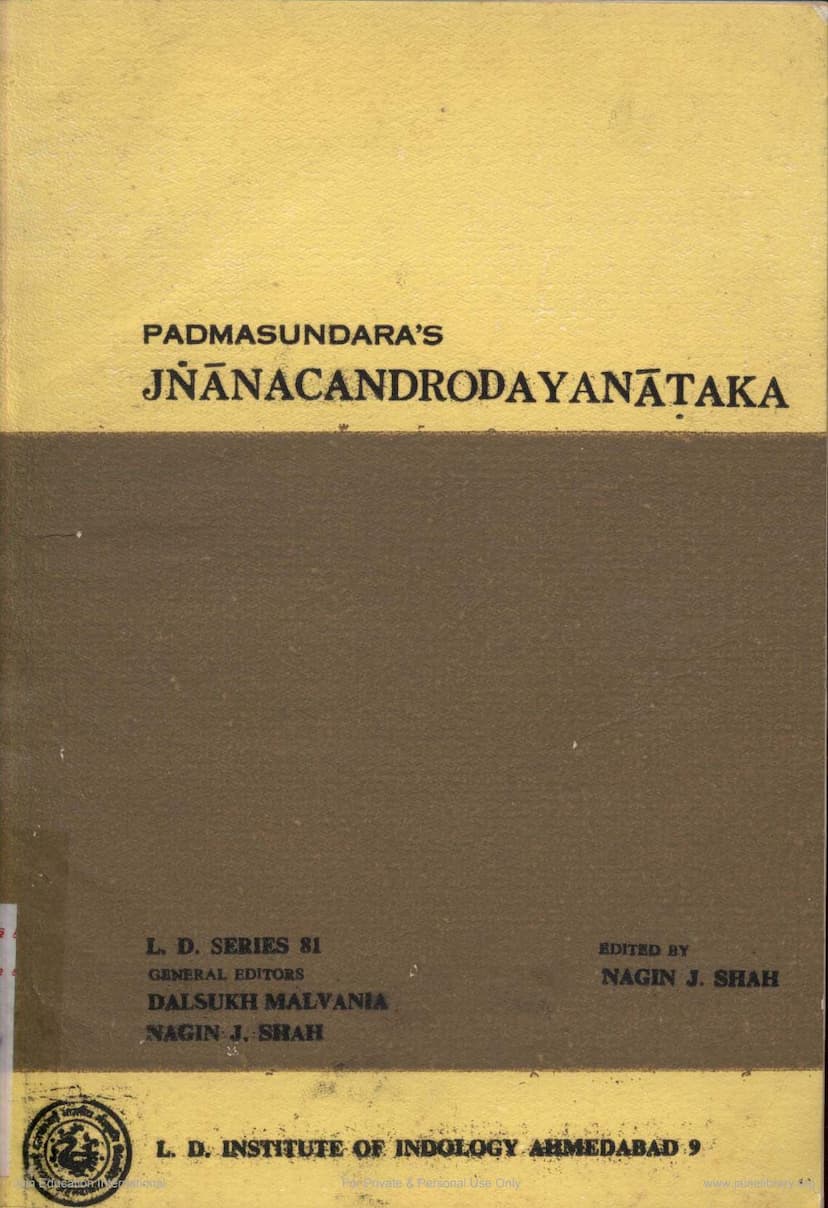Gyanchandrodayanataka
Added to library: September 1, 2025

Summary
Padmasundara's Jñānacandrodayanāțaka is a significant work of Jain philosophy, composed entirely in Sanskrit verses. Edited by Nagin J. Shah and published by the L. D. Institute of Indology, Ahmedabad, in 1981, this work is noted for its philosophical depth and lyrical quality.
Key Aspects of the Work:
- Title Meaning: "Jñānacandrodayanāțaka" translates to "The Rising Moon of Knowledge Drama." While the title suggests a dramatic form, the author himself refers to it as a "vyāyoga," which can be a type of play or a treatise. However, the text itself is presented as a philosophical discourse in verse, without dialogues or personified characters in a dramatic sense.
- Content and Structure: The work is divided into five "Ankas" (Acts) and comprises 398 verses. It delves deeply into Jain philosophy, particularly focusing on the nature of the soul (Atman), karma, bondage (bandha), liberation (moksha), and the intricacies of knowledge (jnana) and reality.
- Author and Lineage: Padmasundara, the author, was a significant Jain scholar and monk belonging to the Svetambara tradition. He was a disciple of Padmameru, who was himself a disciple of Anandameru. Padmasundara was highly regarded, even being honored by Emperor Akbar. Historical accounts suggest he was a contemporary of the renowned Jain poet Banarasidāsa.
- Philosophical Influence: A crucial aspect highlighted in the introduction is Padmasundara's profound influence by the works of Kundakunda, a prominent Jain philosopher. The Jñānacandrodayanāțaka is seen as embodying the essence of Kundakunda's philosophy, particularly his emphasis on Niscaya-naya (the ultimate truth). The editor, Nagin J. Shah, meticulously notes in the footnotes numerous verses from Padmasundara's work that are either identical or very similar in expression to verses found in Kundakunda's seminal works like Pravacanasāra and Samayasāra, and their commentaries by Amrtacandra. This demonstrates Padmasundara's deep assimilation and skillful re-expression of these profound philosophical ideas.
- Key Philosophical Themes Discussed:
- Nature of the Soul (Atman): The verses explore the soul as pure consciousness (Chit), intrinsically blissful, and distinct from the body and other worldly substances.
- Bondage and Liberation: The text elaborates on how karma, fueled by ignorance (ajñana), delusion (moha), passion (raga), and aversion (dvesha), leads to bondage. Liberation is achieved by transcending these impurities through right faith, knowledge, and conduct.
- Knowledge (Jnana): The work discusses various types of knowledge, including impure and pure knowledge, and the ultimate state of omniscience (Kevalajnana). It emphasizes the liberating power of pure knowledge that arises from self-realization.
- Ontology and Metaphysics: The verses delve into the Jain categories of soul (Jiva), non-soul (Ajiva), and their interactions, discussing concepts like substance (dravya), qualities (guna), and modes/attributes (paryaya). The text engages with complex philosophical arguments regarding existence, non-existence, origination, decay, and permanence, often drawing upon the concept of the "Saptabhangi" (Seven-fold Predication).
- Nayas (Perspectives): The interplay and resolution of different philosophical standpoints, particularly the distinction between Vyavahara-naya (conventional truth) and Nischaya-naya (ultimate truth), are central to the work.
- Linguistic and Metrical Style: The work is praised for its sophisticated Sanskrit verse, employing various meters and a rich vocabulary to articulate complex philosophical concepts.
- Manuscript Basis: The present edition is based on a palm-leaf manuscript (No. 7382) from the Sāgaragaccha Jaina Bhandāra preserved in the Hemacandracārya Jñāna mandir, Patan. The manuscript is dated approximately to 1700 V.S. (Vikrama Samvat).
In essence, the Jñānacandrodayanāțaka is a profound philosophical exposition that serves as a testament to Padmasundara's mastery of Jain thought, particularly his deep engagement with and articulation of the teachings of Kundakunda. It aims to illuminate the path to liberation through the understanding and realization of the pure nature of the soul, emphasizing the transformative power of right knowledge and detachment.